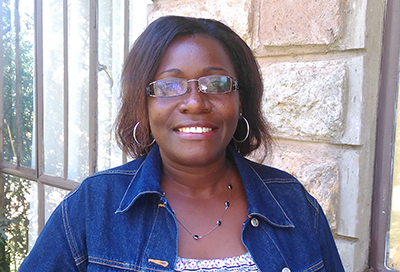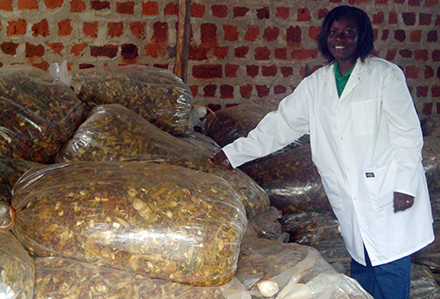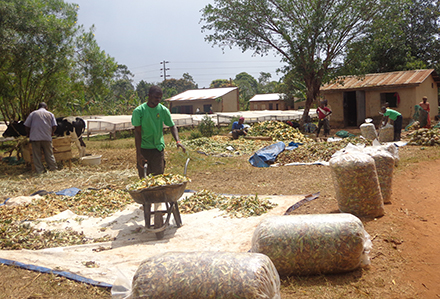Challenges and prospects of integrating livestock into smallholder organic pineapple production
Sylvia Nalubwama, Phd, Uganda
Integration of livestock into organic pineapple production can be enhanced by tackling specific challenges of animal diseases, organic feeds and knowledge on improved farm management practices.
In Uganda, organic farms are diversified with various crops and livestock. Despite crops like pineapples being certified organic, farmers have continued to rear livestock without adherence to organic principles and standards. I found this subject interesting because livestock contributes to the nutrient balance of the whole farming systems for improved efficiency and productivity, which is very relevant for organic agriculture where the system approach for sustainability is emphasized. In addition there is potential to market organic animal products of high quality.
In this research study, l was expected to identify characteristics, practices and challenges of integrating livestock into organic pineapple production and also suggest innovative solutions to some of these challenges. It was envisaged that recommendations from this research would lead to improvements for better management of dairy cattle and future adoption of organic livestock production in organic crop-livestock systems.
In this study, I found that livestock pests and diseases, organic animal feeds and knowledge on improved management practices are the main challenges faced by organic farmers. In response to animal feed challenge especially in dry seasons, I transformed pineapple wastes (peels and crowns) into animal feed silage which was fed to dairy cows with positive impact. Based on this research, further studies are needed to identify specific knowledge gaps in organic animal husbandry that need to be addressed. There is also need for research into other alternative organic feed resources that can support livestock productivity and alternative remedies that can be used in the treatment and control of animal diseases and pests under organic farming systems.
The information generated from this study is beneficial to all farmers who wish to improve their management practices or convert to organic livestock production. Then policy makers, so as to devise policies and strategies that support organic sector development and finally the private sector to be guided on areas for investment for the development of organic livestock production.
Read more about the project

Sylvia Nalubwama, PhD-student.
Makerere University, Uganda.
Enrolment date: Feb 2012
Main Supervisor: F. Kabi
External supervisor: Mette Vaarst
Sylvia Nalubwama is presently preparing for resubmission and defense of her thesis. She is expected to graduate in January 2019. She is an Assitant Lecturer at Makerere University at the Department of livestock and industrial resources. She is teaching research and community outreach with focus on livestock production systems, farm and ranch business planning and management, farm management, organic livestock production, and socioeconomics.
Contact
Sylvia Nalubwama (drnalubwama@gmail.com)
Phone: +256 782 552 706
Department of Livestock and Industrial Resources (LIR)
School of Veterinary Medicine and Animal Resources
College of Veterinary Medicine, Animal Resources and Bio-security (COVAB)
Makerere University, P. Box 7062, Kampala, Uganda
Making of organic pineapple waste silage, a feed for dairy cattle

